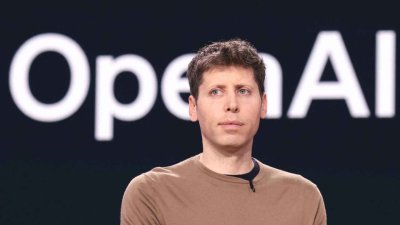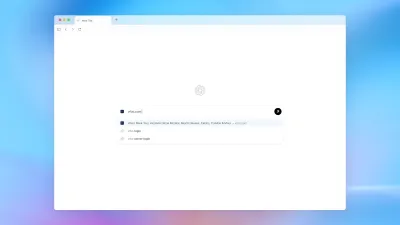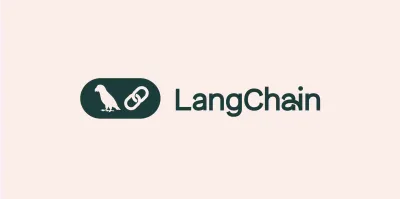OpenAI Enters the Hiring Fray: AI-Powered Job Platform Poised to Disrupt LinkedIn's Dominance
By: @devadigax

OpenAI, the powerhouse behind groundbreaking AI models like ChatGPT and DALL-E, is reportedly venturing into the recruitment sector with its own AI-powered hiring platform. Scheduled for launch in mid-2026, the "OpenAI Jobs Platform" promises to revolutionize the job search and recruitment process, leveraging the company's cutting-edge AI technology to connect businesses with ideal candidates with unprecedented efficiency and accuracy. This move represents a significant challenge to established players like LinkedIn, forcing a potential reshuffling of the online recruiting landscape.
The limited information currently available paints a picture of a platform built on advanced AI algorithms designed to go beyond traditional keyword matching. Instead of simply relying on resume parsing and keyword searches, OpenAI's platform is expected to delve deeper, analyzing candidate profiles for skills, experience, and even personality traits to create far more nuanced matches. This could involve leveraging natural language processing (NLP) to understand the context and subtleties within job descriptions and resumes, effectively identifying candidates whose skills and experience might not be explicitly stated but are highly relevant to the position.
The implications of this are profound. Consider the problem of "keyword stuffing" in resumes, where applicants often overload their CVs with buzzwords to improve search engine rankings. OpenAI's AI could potentially see through this tactic, focusing instead on a candidate's genuine abilities and experience. Furthermore, the platform's AI could identify hidden talents and transferable skills, opening doors for candidates who might otherwise be overlooked by traditional methods. This has the potential to address biases in recruitment and create a more equitable hiring process.
The platform's focus on AI extends beyond candidate matching. It's likely that the OpenAI Jobs Platform will incorporate features to streamline the entire hiring pipeline, from initial screening and interviewing to offer negotiation and onboarding. This could involve AI-powered chatbots for initial candidate engagement, automated scheduling systems, and potentially even AI-driven insights into candidate performance during interviews. The goal seems to be to create a truly end-to-end solution, automating many time-consuming tasks for recruiters while simultaneously enhancing the candidate experience.
However, this ambitious venture also presents significant challenges. Data privacy and security will be paramount concerns. Handling sensitive personal information requires robust security measures to prevent data breaches and ensure compliance with relevant regulations. The ethical implications of using AI in recruitment also need careful consideration. Ensuring fairness and avoiding biases in the algorithms will be crucial to prevent discriminatory outcomes. OpenAI will need to address these concerns transparently and proactively to build trust with users.
The competitive landscape is also a considerable factor. LinkedIn, with its vast network and established user base, represents a formidable competitor. OpenAI will need to differentiate its platform significantly to attract both businesses and job seekers. This could involve offering unique features such as advanced skills assessments, personalized career advice, or perhaps even integrating with OpenAI's other products to offer a more holistic job search experience.
The 2026 launch date offers OpenAI a window to refine its platform and address potential challenges. This timeframe also allows for the further development of AI technologies, which could significantly improve the platform's capabilities by then. While the details remain scarce, the potential impact of an AI-powered hiring platform from a company like OpenAI is undeniable. It’s a move that signals a significant shift in the recruitment industry, one that could reshape how we find jobs and how companies find talent in the years to come. The success of the OpenAI Jobs Platform will depend not only on its technological prowess but also on its ability to navigate the ethical and competitive complexities of the hiring landscape.
The limited information currently available paints a picture of a platform built on advanced AI algorithms designed to go beyond traditional keyword matching. Instead of simply relying on resume parsing and keyword searches, OpenAI's platform is expected to delve deeper, analyzing candidate profiles for skills, experience, and even personality traits to create far more nuanced matches. This could involve leveraging natural language processing (NLP) to understand the context and subtleties within job descriptions and resumes, effectively identifying candidates whose skills and experience might not be explicitly stated but are highly relevant to the position.
The implications of this are profound. Consider the problem of "keyword stuffing" in resumes, where applicants often overload their CVs with buzzwords to improve search engine rankings. OpenAI's AI could potentially see through this tactic, focusing instead on a candidate's genuine abilities and experience. Furthermore, the platform's AI could identify hidden talents and transferable skills, opening doors for candidates who might otherwise be overlooked by traditional methods. This has the potential to address biases in recruitment and create a more equitable hiring process.
The platform's focus on AI extends beyond candidate matching. It's likely that the OpenAI Jobs Platform will incorporate features to streamline the entire hiring pipeline, from initial screening and interviewing to offer negotiation and onboarding. This could involve AI-powered chatbots for initial candidate engagement, automated scheduling systems, and potentially even AI-driven insights into candidate performance during interviews. The goal seems to be to create a truly end-to-end solution, automating many time-consuming tasks for recruiters while simultaneously enhancing the candidate experience.
However, this ambitious venture also presents significant challenges. Data privacy and security will be paramount concerns. Handling sensitive personal information requires robust security measures to prevent data breaches and ensure compliance with relevant regulations. The ethical implications of using AI in recruitment also need careful consideration. Ensuring fairness and avoiding biases in the algorithms will be crucial to prevent discriminatory outcomes. OpenAI will need to address these concerns transparently and proactively to build trust with users.
The competitive landscape is also a considerable factor. LinkedIn, with its vast network and established user base, represents a formidable competitor. OpenAI will need to differentiate its platform significantly to attract both businesses and job seekers. This could involve offering unique features such as advanced skills assessments, personalized career advice, or perhaps even integrating with OpenAI's other products to offer a more holistic job search experience.
The 2026 launch date offers OpenAI a window to refine its platform and address potential challenges. This timeframe also allows for the further development of AI technologies, which could significantly improve the platform's capabilities by then. While the details remain scarce, the potential impact of an AI-powered hiring platform from a company like OpenAI is undeniable. It’s a move that signals a significant shift in the recruitment industry, one that could reshape how we find jobs and how companies find talent in the years to come. The success of the OpenAI Jobs Platform will depend not only on its technological prowess but also on its ability to navigate the ethical and competitive complexities of the hiring landscape.
Comments
Related News

OpenAI Unveils ChatGPT Atlas: Your Browser Just Became Your Smartest AI Assistant
In a move poised to fundamentally reshape how we interact with the internet, OpenAI has officially launched ChatGPT Atlas, a gr...
@devadigax | 22 Oct 2025
In a move poised to fundamentally reshape how we interact with the internet, OpenAI has officially launched ChatGPT Atlas, a gr...
@devadigax | 22 Oct 2025

Netflix Doubles Down on Generative AI, Challenging Hollywood's Divide Over Creative Futures
In a move that underscores a growing chasm within the entertainment industry, streaming giant Netflix is reportedly going "all ...
@devadigax | 21 Oct 2025
In a move that underscores a growing chasm within the entertainment industry, streaming giant Netflix is reportedly going "all ...
@devadigax | 21 Oct 2025

AI Agent Pioneer LangChain Achieves Unicorn Status with $1.25 Billion Valuation
LangChain, the innovative open-source framework at the forefront of building AI agents, has officially joined the exclusive clu...
@devadigax | 21 Oct 2025
LangChain, the innovative open-source framework at the forefront of building AI agents, has officially joined the exclusive clu...
@devadigax | 21 Oct 2025

Meta Boots ChatGPT From WhatsApp: A Strategic Play for AI Dominance and Walled Gardens
In a significant move that reshapes the landscape of AI chatbot accessibility, OpenAI has officially confirmed that its popular...
@devadigax | 21 Oct 2025
In a significant move that reshapes the landscape of AI chatbot accessibility, OpenAI has officially confirmed that its popular...
@devadigax | 21 Oct 2025

Meta's New AI Peeks Into Your Camera Roll: The 'Shareworthy' Feature Raises Privacy Eyebrows
Meta, the parent company of Facebook, has rolled out a new, somewhat controversial artificial intelligence feature to its users...
@devadigax | 18 Oct 2025
Meta, the parent company of Facebook, has rolled out a new, somewhat controversial artificial intelligence feature to its users...
@devadigax | 18 Oct 2025
 AI Tool Buzz
AI Tool Buzz